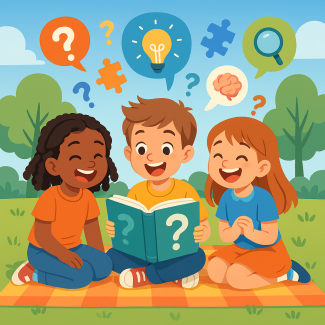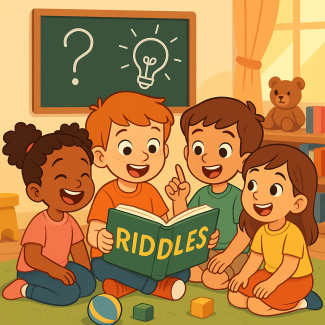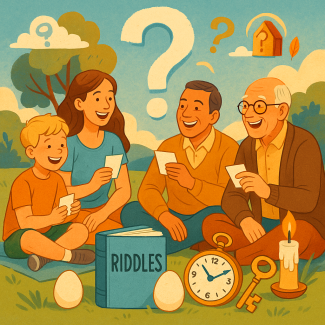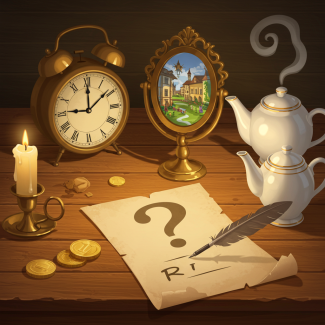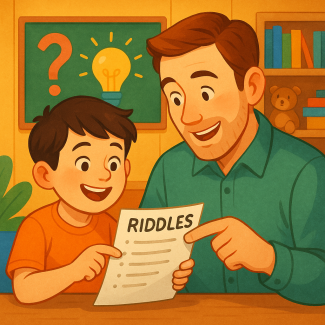
Fun and Easy Riddles for Kids and Adults to Enjoy Together
Discover beginner-friendly riddles that make learning and thinking fun for all ages
Riddles are more than just word games—they’re mental playgrounds. Whether you’re sharing laughs with friends, challenging your kids, or just taking a break from daily routines, easy riddles for beginners offer a simple, delightful way to boost critical thinking and spark joy. This article explores what makes these light puzzles so irresistible and shows you how to ease into the world of riddles, no matter your age or experience level.
From classic brain teasers to fresh modern puzzles, we’ll dive into how riddles work, why they’re so satisfying to solve, and how they can turn even the most hesitant thinker into a riddle-lover.
What are some examples of easy riddles for beginners?
Easy riddles typically follow a few tried-and-true patterns: they use familiar objects, simple logic, and wordplay that relies on common knowledge. These aren’t meant to stump—they’re meant to surprise, delight, and give you that satisfying “aha!” moment. Think of them as stepping stones to deeper thinking.
A few typical beginner formats include:
- Descriptive clues about common objects: “What has hands but can’t clap?”
- Situational questions with twist endings: “You see a boat filled with people. It hasn’t sunk, but when you look again, you don’t see a single person on board. Why?”
- Rhyming riddles with obvious answers if you listen closely
What makes these great is that they create a sense of achievement without frustration. They’re fun, educational, and easy to share, especially with children or puzzle newbies.
Why are riddles good for your brain?
Solving riddles isn't just fun—it’s mentally stimulating. The brain thrives on curiosity, and riddles feed that need for patterns, meaning, and resolution. Here’s what happens when you engage with simple riddles for beginners:
- You learn how to think flexibly
- You improve your problem-solving skills
- You train your brain to notice subtle clues and question assumptions
- You strengthen your language comprehension through wordplay
Even basic riddles can light up neural pathways associated with memory, logic, and creativity. For kids, this translates into stronger classroom performance. For adults, it keeps cognitive abilities sharp. It’s no wonder family-friendly riddles are a hit across generations.
Where can you use easy riddles in everyday life?
Once you get the hang of a few riddles, you’ll find they fit perfectly into all kinds of everyday moments. They’re great for:
- Road trips: Keep minds engaged without screens
- Classrooms: Ice-breakers or warm-ups to get students thinking
- Family dinners: A fun tradition to spark conversation
- Game nights: Great low-pressure starters before jumping into more competitive rounds
- Team building: Boost collaboration and creativity in the workplace
The beauty of beginner riddles is that they don’t require any materials, setup, or prior knowledge. You just need a voice and a little imagination.
How do easy riddles help with language and learning?
For children especially, simple riddles are more than just play—they’re tools for language development. Riddles encourage kids to:
- Recognize double meanings and wordplay
- Develop listening comprehension and focus
- Expand vocabulary in a fun, memorable way
And for multilingual learners, riddles introduce idioms and cultural logic in a digestible format. They promote a sense of rhythm in language, helping kids feel more confident expressing ideas and exploring words creatively.
Adults, too, benefit from this kind of play—especially when learning a new language or trying to stay mentally active.
Why do people love easy riddles so much?
There’s something universal about the joy of figuring something out. The moment the answer “clicks,” our brains get a dopamine boost—it’s the same chemical reward triggered by winning a game or solving a puzzle.
Easy riddles offer that dopamine kick with zero stress. No stakes, no pressure—just clever questions that anyone can enjoy. They create moments of laughter, bonding, and pride. You don’t need to be a trivia master or logic wizard. All you need is curiosity and a few minutes of playful thinking.
And unlike complex brainteasers, easy riddles for all ages are inclusive. A child and a grandparent can enjoy the same riddle and both feel equally delighted when they solve it.
What makes a riddle beginner-friendly?
Not all riddles are created equal. Some are designed to trick and frustrate, but easy riddles aim to engage and reward. The best beginner-friendly riddles follow these principles:
- They have clear structure and are easy to read or hear
- They involve everyday concepts or objects most people recognize
- They don’t rely heavily on obscure references
- Their answers feel “obvious” in hindsight—creating a satisfying loop of discovery
These puzzles are designed to encourage, not intimidate. That’s what makes them perfect for introducing people to the world of brain games.
Why you’ll love starting your puzzle journey with easy riddles
There’s a quiet magic in those first few riddles. The ones you solve quickly—and the ones that stump you just enough to make the answer even more satisfying. Riddles for beginners aren’t just entertainment; they’re a gentle invitation into a world of curiosity and logic, disguised as fun.
Imagine a rainy afternoon turned into a giggle-filled memory with your kids. A classroom buzzing with excitement as students rush to shout out answers. Or a moment of connection at a dinner table as generations laugh at the same clever line.
These moments are built on simple riddles. And once you’ve started, you’ll see how addictive the fun can be.
If you've ever wanted a screen-free way to connect, laugh, or think a little deeper, starting with easy riddles might be exactly what you didn’t know you needed.
Enjoyed the read? Share this with a friend who loves clever questions or wants to introduce riddles to their kids—it’s always more fun when others join in.
30 easy riddles with answers for beginners and kids
These carefully selected riddles are designed to be simple, fun, and mentally stimulating without being overly complex. They are perfect for first-timers, children, and anyone looking to enjoy easy riddles with answers that spark joy and confidence. Each one is crafted to help build logical thinking while providing a quick burst of entertainment.
- What has to be broken before you can use it?
An egg - What goes up but never comes down?
Your age - What has hands but can’t clap?
A clock - What has a head, a tail, but no body?
A coin - What gets wetter the more it dries?
A towel - What belongs to you but other people use it more than you do?
Your name - What can you catch but not throw?
A cold - What has one eye but can’t see?
A needle - What comes once in a minute, twice in a moment, but never in a thousand years?
The letter M - I’m tall when I’m young and short when I’m old. What am I?
A candle - What can travel all around the world while staying in the same spot?
A stamp - What has many keys but can’t open any doors?
A piano - What has legs but doesn’t walk?
A table - What kind of band never plays music?
A rubber band - What has a neck but no head?
A bottle - Where does today come before yesterday?
In a dictionary - What has words but never speaks?
A book - What can fill a room but takes up no space?
Light - What has an eye but cannot blink?
A hurricane - What comes down but never goes up?
Rain - What has four wheels and flies?
A garbage truck - What can you hold without touching it?
A conversation - What kind of tree can you carry in your hand?
A palm - What gets bigger the more you take away?
A hole - What has a face and two hands but no arms or legs?
A clock - What comes in a minute, twice in a moment, but not once in a thousand years?
The letter M - What can you keep after giving it to someone?
Your word - What has an end but no beginning, a home but no family, and a space but no room?
A keyboard - The more of me you take, the more you leave behind. What am I?
Footsteps - I have cities, but no houses. I have mountains, but no trees. I have water, but no fish. What am I?
A map
How to use riddles for parties, classrooms, and game nights
Riddles can be a powerful, low-cost way to inject energy into group settings. Whether you're a teacher, party planner, or simply the most prepared parent at a gathering, knowing a few fun riddles for group activities turns you into an instant entertainer.
Here are practical ways to integrate them:
- Icebreaker challenges: Use simple riddles at the beginning of a meeting or class to ease participants into a collaborative mindset.
- Team competitions: Divide people into teams and keep score with a whiteboard or paper. Use a mix of easy and funny riddles to keep the pace light.
- DIY riddle hunt: Create a riddle-based scavenger hunt. Each answer leads to the next clue, making it both interactive and mentally stimulating.
- Brain break sessions: Ideal for classroom transitions or long work sessions. Short riddles offer just enough pause to refresh thinking without losing focus.
By incorporating easy riddles for beginners into shared experiences, you create not only entertainment but opportunities for bonding and laughter.
Best formats for sharing riddles with kids and beginners
To maximize the fun of riddle games for kids, delivery matters. While spoken riddles are the most common, other formats can add extra engagement, especially for visual or kinesthetic learners.
Try these approaches:
- Printable riddle cards: Create a colorful set that kids can flip through or use as part of a matching game.
- Riddle of the day board: Post a new riddle each morning on a fridge whiteboard or classroom corkboard.
- Digital slideshows: Perfect for Zoom sessions, these slides can include animated graphics or audio cues for each answer.
- Story-based riddles: Present riddles as part of a short narrative or character journey, encouraging kids to solve them to “unlock” the next scene.
The key is to keep it simple and engaging. Choose short riddles with answers that can be grasped in a few seconds. These formats also encourage active participation—everyone wants a turn.
Easy riddles for language learning and creative thinking
When used intentionally, easy riddles for English learners double as language development tools. They introduce new vocabulary, reinforce grammar patterns, and foster playful engagement with the structure of words.
Here’s why educators love using riddles for language development:
- Exposure to idioms: Phrases like “hold your tongue” or “cold shoulder” are easier to understand when wrapped in a joke or riddle.
- Practice with logic connectors: Many riddles follow patterns like cause-effect or comparison-contrast, which helps learners master these subtle nuances.
- Improved retention: Because riddles are short and humorous, learners are more likely to remember both the riddle and its language content.
Riddles are especially useful for young students or those learning English as a second language. And for native speakers, they build sharper syntax awareness and reinforce mental flexibility.
Why riddles build better conversations and closer relationships
One of the most underrated aspects of sharing simple riddles for beginners is how they unlock connection. Riddles invite conversation, laughter, and shared problem-solving—three things that naturally deepen human interaction.
In social settings, riddles serve as:
- Conversation starters: Especially helpful for shy kids or mixed-age groups, where direct questions can feel intimidating.
- Moments of surprise: Solving a riddle can create a small sense of victory, which makes people more open and expressive.
- Memory anchors: People tend to remember who told them a particularly clever riddle—and often repeat it to someone else, sparking a chain of shared joy.
Whether it's a teacher bonding with students, siblings playing together, or colleagues relaxing during lunch, riddles for beginners can quietly knit people closer.
How to build your own easy riddles for fun and creativity
For those ready to take riddling to the next level, writing your own is a great exercise in creativity. Creating original easy riddles helps sharpen language skills, encourages imagination, and offers a unique way to personalize entertainment.
Start with this simple framework:
- Pick a familiar object: Something common like a spoon, a cloud, or a sock.
- List features or actions: What it does, how it looks, where it's found.
- Play with ambiguity: Focus on a trait that could apply to more than one thing.
- Keep it short: One or two lines is ideal for beginner riddles.
- End with a twist: Make sure the answer feels surprising, yet obvious in hindsight.
Example:
“I have no teeth, but I still eat every day. I get bigger, but I never weigh.”
Answer: A fire
Once you create your first few riddles, it becomes addictive. It’s a playful way to sharpen communication skills while entertaining friends and family with something uniquely yours.
Ready to make someone smile? Try sharing one of these riddles with a friend, your child, or a coworker—sometimes all it takes is a clever question to turn an ordinary moment into something memorable.

